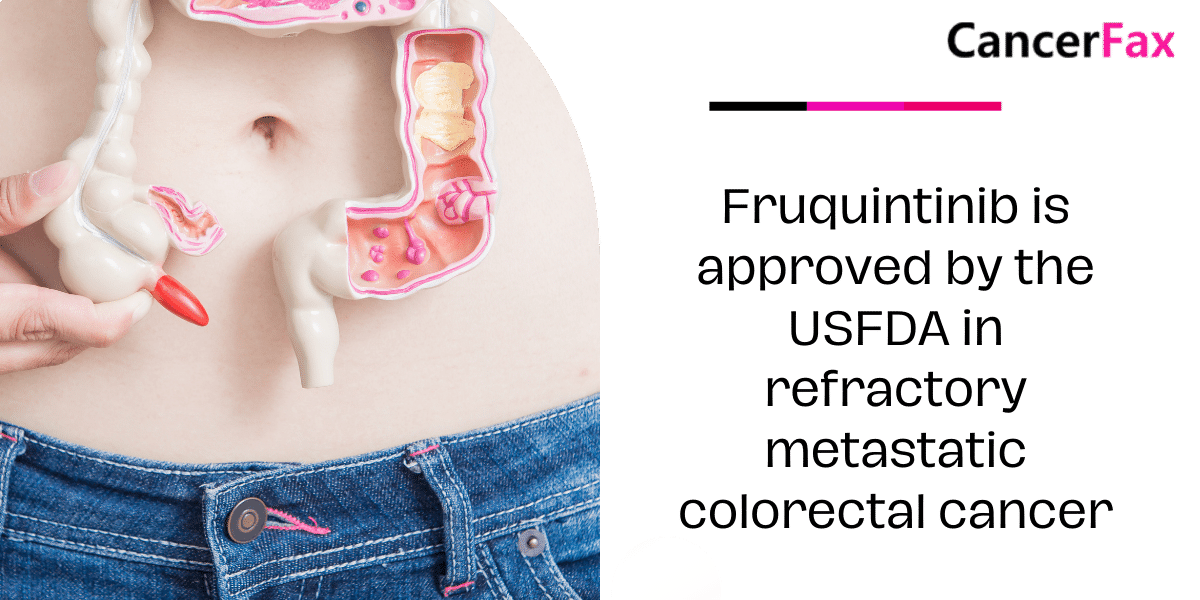Fruquintinib is approved by the USFDA in refractory metastatic colorectal cancer
The Food and Drug Administration approved fruquintinib (Fruzaqla, Takeda Pharmaceuticals, Inc.) on November 8, 2023, for adult patients with metastatic colorectal cancer (mCRC) who have undergone specific prior treatments.
The effectiveness was assessed in FRESCO-2 (NCT04322539) and FRESCO (NCT02314819). The FRESCO-2 trial (NCT04322539) assessed 691 patients with mCRC who experienced disease progression after previous fluoropyrimidine-, oxaliplatin-, irinotecan-based chemotherapy, anti-VEGF biological therapy, anti-EGFR biological therapy (if RAS wild type), and at least one of trifluridine, tipiracil, or regorafenib. It was an international, multicenter, randomized, double-blind, placebo-controlled study. The FRESCO trial, a multicenter study in China, assessed 416 patients with metastatic colorectal cancer who experienced disease progression following previous fluoropyrimidine-, oxaliplatin-, and irinotecan-based chemotherapy.
In both trials, patients were randomly assigned to either get fruquintinib 5 mg orally once a day or a placebo for the first 21 days of each 28-day cycle. They also got the best possible supportive care. Patients were treated until disease progression or unacceptable toxicity occurred.
The primary effectiveness outcome in both trials was overall survival (OS). The median overall survival in the FRESCO-2 study was 7.4 months (95% CI: 6.7, 8.2) for patients who received fruquintinib and 4.8 months (95% CI: 4.0, 5.8) for those in the placebo group. The hazard ratio was 0.66 (95% CI: 0.55, 0.80) with a p-value of less than 0.001. In the FRESCO study, the median overall survival was 9.3 months (95% CI: 8.2–10.5) for the first therapy group and 6.6 months (95% CI: 5.9–8.1) for the second. The hazard ratio was 0.65 (95% CI: 0.51, 0.83) and the p-value was less than 0.001.
The prevalent side effects (experienced by 20% or more of patients) included hypertension, palmar-plantar erythrodysesthesia, proteinuria, dysphonia, abdominal pain, diarrhea, and asthenia.
The suggested fruquintinib dosage is 5 mg taken orally once a day, with or without food, for the initial 21 days of a 28-day cycle until disease progression or intolerable toxicity.
Susan Hau is a distinguished researcher in the field of cancer cell therapy, with a particular focus on T cell-based approaches and cancer vaccines. Her work spans several innovative treatment modalities, including CAR T-cell therapy, TIL (Tumor-Infiltrating Lymphocyte) therapy, and NK (Natural Killer) cell therapy.
Hau's expertise lies in cancer cell biology, where she has made significant contributions to understanding the complex interactions between immune cells and tumors.
Her research aims to enhance the efficacy of immunotherapies by manipulating the tumor microenvironment and exploring novel ways to activate and direct immune responses against cancer cells.
Throughout her career, Hau has collaborated with leading professors and researchers in the field of cancer treatment, both in the United States and China.
These international experiences have broadened her perspective and contributed to her innovative approach to cancer therapy development.
Hau's work is particularly focused on addressing the challenges of treating advanced and metastatic cancers. She has been involved in clinical trials evaluating the safety and efficacy of various immunotherapy approaches, including the promising Gamma Delta T cell therapy.
- Comments Closed
- March 3rd, 2024






Angiogenesis inhibitor breakthrough, FDA-approved colon drugs 2023, Fruquintinib approval, Fruzaqula for mCRC, Metastatic CRC options, Refractory colorectal cancer, Third-line CRC treatment, VEGFR inhibitor therapy
CancerFax is the most trusted online platform dedicated to connecting individuals facing advanced-stage cancer with groundbreaking cell therapies.
Send your medical reports and get a free analysis.
🌟 Join us in the fight against cancer! 🌟
Привет,
CancerFax — это самая надежная онлайн-платформа, призванная предоставить людям, столкнувшимся с раком на поздних стадиях, доступ к революционным клеточным методам лечения.
Отправьте свои медицинские заключения и получите бесплатный анализ.
🌟 Присоединяйтесь к нам в борьбе с раком! 🌟